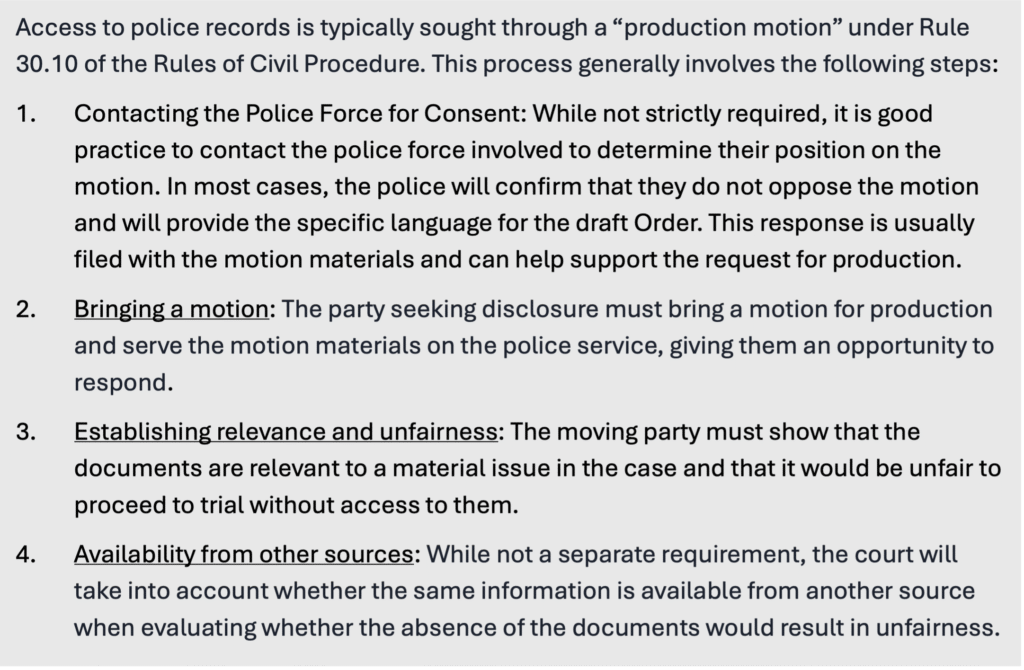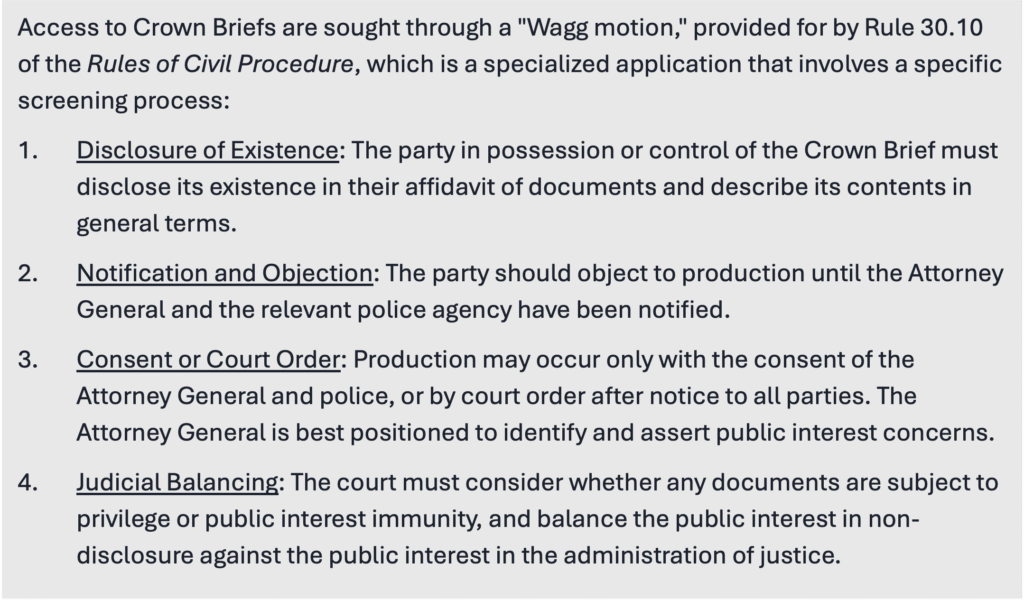Obtaining Police Disclosure in Civil Cases
What You Need to Know About Police Disclosure in Personal Injury Lawsuits
Introduction
In many civil lawsuits, particularly those arising from motor vehicle accidents or serious personal injuries, police records can be a crucial source of evidence. These records may contain objective accounts, witness statements, or investigative findings that are otherwise unavailable. However, commencing a civil action does not automatically entitle a party to access police records. Unlike parties to the litigation, police are typically non-parties and are not required to produce documents unless ordered to do so by the court.
This article outlines the legal framework for obtaining police disclosure in Ontario civil litigation and provides practical guidance on when and how to seek such records.
What Is Police Disclosure?
Police disclosure refers to the production of documents and evidence collected by law enforcement during the investigation of an incident. This may include accident reports, officers’ notes, photographs or videos, 911 call recordings or transcripts, and surveillance footage. Because police are “non-parties” to civil proceedings, a court order, typically obtained by bringing a motion, is required to access these documents.
It is important to note that some police records may be subject to privilege (such as informer privilege or solicitor-client privilege) or privacy legislation (such as the Municipal Freedom of Information and Protection of Privacy Act), which may affect their production or require redactions.
When is Police Disclosure Required in Civil Cases?
Police records are often sought in civil proceedings where liability is contested or where independent, reliable, first-hand evidence is essential to proving or defending a claim. For example, a plaintiff suing a drunk driver may benefit from the police report, which can provide objective evidence regarding the circumstances of the incident. These records can help confirm what happened, identify who was at fault, and obtain the identity of independent witnesses, strengthening the evidentiary foundation of a claim.
Requesting Police Records – Non-Party Production Motion under Rule 30.10 of the Rules of Civil Procedure
In Ontario, access to police records in a civil action is typically sought under Rule 30.10 of the Rules of Civil Procedure. This rule allows a party to bring a motion to compel a non-party, such as a police service, to produce relevant documents not otherwise available through standard discovery.

The court will balance the interests of the parties and the police, and may order full production, partial production, or impose redactions to protect third-party privacy, ongoing investigations, or other public policy concerns.
It’s important to note that although this process can be time consuming, it is often an important part of building a strong case. To avoid delays in litigation, ensure early requests for production are made.

Requesting Crown Briefs – Wagg Motion under Rule 30.10 of the Rules of Civil Procedure
If the incident that gave rise to the civil action also resulted in criminal charges, the relevant police documents may be included in a Crown Brief. A Crown Brief is a compilation of materials, such as officer notes, witness statements, photographs, and expert reports, prepared by the police and provided to the Crown for the purpose of prosecuting a criminal offence.
Crown Briefs are protected by a qualified public interest privilege. The leading authority, D.P. v. Wagg (2004 CanLII 39048 (ON CA)), established that while Crown Briefs are not automatically accessible, they are not absolutely shielded from production in civil proceedings.

It’s important to note that if related criminal proceedings are ongoing, courts are generally reluctant to order production of Crown Brief materials, recognizing a qualified public interest privilege to protect the integrity of the criminal process. Once criminal proceedings are complete, the balance may shift in favour of production.
Conclusion
Police records can be a valuable source of evidence in personal injury and other civil lawsuits but obtaining them requires navigating a formal court process. Whether you are seeking an officer’s notes, a crash report, or a full Crown Brief, understanding the applicable rules and planning is critical. Early and strategic requests, supported by clear legal argument, can make a significant difference in the outcome of a case.
